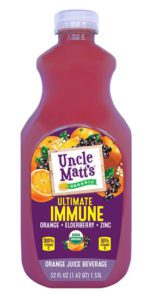Juice brand Uncle Matt’s Organic last month opened an ecommerce site where it sells mixed bundles of its products directly to consumers.
The brand decided to start selling online after hearing from consumers who could not find the brand locally or whose favorite stores did not carry the Uncle Matt’s products they wanted, says founder and CEO Matt McLean.
He said customers showed an interest in buying Uncle Matt’s products in areas where it’s not yet available. Also, ecommerce made sense because of changing buying patterns created by the COVID-19 crisis—which generated a surge in demand for grocery ecommerce, as shoppers became wary of entering stores, he says.
A report released last fall by grocery ecommerce platform Mercatus USA Inc. and research firm Incisiv estimated online grocery purchases would account for 10.2% of all U.S. grocery sales in 2020, more than double the 4.3% online share forecast prior to the pandemic. The study also projects grocery purchases will account for about 21.5% of total U.S. grocery sales by 2025, reaching an estimated $250 billion.
“For us, it was kind of a natural progression. We do quite a bit of [sales] online with retailers on Instacart and things like that,” McLean says.
Direct-to-consumer ecommerce allows Uncle Matt’s to serve remote areas where its juices aren’t in supermarkets and offer a better variety to shoppers whose local store might carry just two or three of its roughly 20 products.

Its new ecommerce site allowed Uncle Matt’s Organic to roll out its Ultimate Immune product faster than it otherwise could.
Yet another advantage, he says, is that online sales allow Uncle Matt’s to get new products to market faster than it could by selling them wholesale. For example, he cited the brand’s Ultimate Immune product—made with orange juice, elderberry juice and zinc—which launched during the pandemic and is currently available on the ecommerce site.
“It takes a while for a supermarket, through a review cycle, to actually put it on the shelf,” McLean says. Sometimes, the process can take six to nine months, so offering the product on its website allowed the brand to get Ultimate Immune in consumers’ homes a lot quicker than that, while it waits for orders from supermarkets, he says.
To fulfill orders in the eastern United States, Uncle Matt’s uses a third-party logistics (3PL) firm, which McLean declined to name. Later in the first quarter, the brand plans to hire a second 3PL to handle orders on the West Coast. Once a second 3PL comes on board, he says, the ecommerce operation will be able to ship to about 95% of the U.S. population.
The new site, built with Shopify Inc. ecommerce platform, allows online shoppers to purchase a bundle of six 52-ounce bottles or two six-packs of 12-ounce bottles. Uncle Matt’s sends orders to consumers packed in ice, using two-day ground shipping, usually using FedEx, McLean says. While this is a heavy package, because consumers are purchasing more than one bottle it is economical to ship, he says.
So far, McLean says, the ecommerce operation is meeting his expectations. He says Uncle Matt’s been pleasantly surprised with its 3PL’s ability to ship its products and get them there on time and in good condition. “But like anything, we’re still learning,” he says.
Among the advantages of using a 3PL, he says, is that the vendor can leverage economies of scale to get lower shipping rates than Uncle Matt’s would likely negotiate on its own.
“We are, as a company, going to really lean in to try and be as efficient and effective as we can in ecommerce in 2021,” McLean says. To do that, he added the brand is hiring additional staff to support and market the ecommerce operation.
Digital marketing so far, McLean says, consists of “a mix of paid ad strategies, including social media, search ads and Pinterest support,” without providing specifics. The brand also does email marketing.
“Email marketing should always be a priority in any ecommerce effort. That personal brand to consumer relationship produces a positive ROI,” McLean says.
Eventually, the brand plans to add additional products to the ecommerce site. McLean declined to be specific but says he’s looking into items that would have the weight, shelf life and durability to make them ecommerce-friendly, which are attributes his current juice product does not offer. He says the brand is also looking into offering a subscription service and plans to offer special online-only deals. Eventually, he says, the brand would like to grow its ecommerce operation to about 20% of its annual sales.
So far, McLean says, its wholesale accounts haven’t complained about Uncle Matt’s decision to sell directly to consumers online. Buying the brand’s products from its website is more expensive than buying in stores—which he says is justifiable because of the convenience of having them delivered directly to consumers’ homes. A pack six 52-ounce bottles costs $48 to $54, including shipping. An order of two six-packs of 12-ounce bottles costs $43.20, including shipping.
“If we were undercutting our retailers, I would say they could be potentially upset,” he says. But the ecommerce operation also has the potential to give retailers an indication of how well any new product might sell in their stores.
Uncle Matt’s products are available in stores and online from retailers including Whole Foods (owned by Amazon.com Inc., No. 1 in the 2020 Digital Commerce 360 Top 1000), Kroger Co. (No. 13), Target Corp. (No. 12), Publix Super Markets Inc. (No. 132), Wegmans Food Markets Inc., Harris Teeter Supermarkets Inc. (owned by Kroger) and Ingles Markets Inc.
Uncle Matt’s, which bills itself as the nation’s oldest organic juice company, started in 1999. In 2017, Dean Foods Co. purchased the brand, retaining the leadership team, including McLean and his wife, Susan McLean. In mid-2020, the McLeans, along with a group of other investors, re-purchased Uncle Matts in the wake of Dean Foods’ bankruptcy.
Favorite
